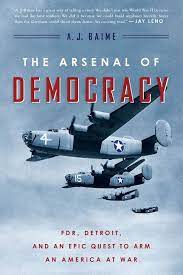Liberators & The Good Fight
There is absolutely nothing as good as a well-written history book to improve one’s perspective. Thinking that we might have it tough today? Worried about leadership and the direction of the country or the world? Look no further than a study of how the United States navigated through World War II to make one grateful and appreciative. Ten years ago A.J. Baime wrote The Arsenal of Democracy: FDR, Detroit, and an Epic Quest to Arm America at War. It remains relevant, informative, and a gripping read.
Baime is a journalist, author, and public speaker who knows how to spin a tale. His 2009 book, Go Like Hell, was a best-seller that later became the movie Ford v. Ferrari. Baime is able to frame big-picture themes while rendering them personal, giving readers a real sense of the people involved. That skill is clearly evident in Arsenal of Democracy. It is a book about an extraordinarily important issue – how American industrial might was essential to the Allies effort to win World War II – with close attention to the dramatic story of three generations in the Ford family. While it might not be the most comprehensive or inclusive way to tell the complex history of the rise of the American armament industry in the 1940s, it is nonetheless memorable and very entertaining.
Understanding the history requires an appreciation of overlapping and intersecting lines of power and influence. Internationally, the rise of Hitler’s Germany was not understood by many at the time to be an existential threat to democratic values. Baime sketches this deftly, using Charles Lindbergh as an example of a pacifist, apologist, and political naif. US domestic policy was of even greater importance. Baime goes quickly here, using President Roosevelt as the primary lens through which to explain planning and policy. There is little in Arsenal of Democracy on the New Deal, US industrial policy, or even domestic economics. What Baime does explain well is the economics of Ford Motors and its extraordinary rise from start up to one of the globe’s most profitable and important companies, all within a few decades. Ford is where Baime anchors this history.
Henry Ford, of course, is the dramatic focus. Brilliant, driven, and more than a little anti-Semitic and eccentric, Ford was one of the most significant and divisive figures of the early 1900s. Baime is a generous biographer, at times giving the elder Ford the benefit of the doubt. He characterizes Ford’s son, Edsel, in tragic terms, while Henry Ford II is not fully examined as a figure. The back and forth of these three men over the years is at the heart of The Arsenal of Democracy.
Garnering less attention in the book are the technical aspects of what Ford and other companies did during the war. The production of the Liberator, a heavy bomber, was very important. So, too, was the rise of the shipbuilding industry, the creation of weapons, and much more. Curious readers will have to look elsewhere to gain a broader comprehension of the many different ways that the American economy responded to the challenges of World War II. The period experienced extremely complicated labor history, massive racial strife, gender issues, and much more – all while the very existence of the democratic west was under immediate and dire threat. This history is one thread in a larger and vitally important history.
There is so very much to recommend in Arsenal of Democracy. Baime has made complicated history intelligible, has highlight the right issues, and reminded us all of the great debt we owe those that fought to preserve democracy in World War II. While far from the final word, it is nevertheless a much appreciated history that invites further investigation. What more could one want from history?
David Potash
